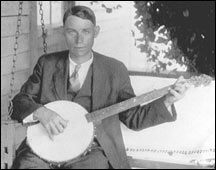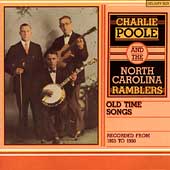

Charlie Poole(Listen to Charlie Poole- see links at bottom of page.)Charlie Poole & his North Carolina Ramblers were one of the most popular string bands of the 1920s and had a great influence on the development of bluegrass music. Poole is largely responsible for popularizing the banjo and created a unique playing style involving his thumb and two fingers.
He was born in Randolph County, North Carolina, and spent much of his adult life working in textile mills. He learned banjo as a youth and also played baseball. (It is believed that his playing style stemmed from a baseball accident involving his thumb.) When not working in mills, he would travel from town to town across the country to play banjo and work. He ended up settling in Spray, North Carolina in 1918 and married two years later. His brother-in-law, fiddler Posey Rorer, would often play together with other local musicians and these became the North Carolina Ramblers. Poole and Rorer teamed up with guitarist Norm Woodlief in 1925 and began recording careers in New York for Columbia Records. There they cut four songs; all were successful, including the bluesy "Don't Let Your Deal Go Down," a country standard and Poole's signature song. The Ramblers were suddenly a popular stringband. Though the personnel changed frequently over the years, the band's unusual sound remained consistent. As vocalist, Poole sang with a plain, uninflected style that complemented his complex banjo picking. The songs they sang were a mixture of minstrel songs, Victorian ballads, and humorous burlesques all delivered with Poole's straight-faced dry wit. Through the rest of the decade, the Ramblers released close to 60 singles for Columbia. Like many country performers to follow, Poole lived a fast life; he was a hard drinking man, rowdy and reckless.
When the Depression hit in 1930, Poole's career had peaked and his popularity began waning -- as did his self-confidence. As a result, he began drinking even more heavily. Scheduled to appear in a film in 1931, he unfortunately went on a bender and died of heart failure before he could get to Hollywood. After his death, Rorer (who had left the band in 1929) and guitarist Roy Harvey (who'd replaced Woodlief around the same time), began leading the North Carolina Ramblers. (The group continued to record and perform for a quite a few years afterward.) Poole's music enjoyed renewed popularity during the folk revival of the '60s and in 1993, a CD of his best songs was released. Also, Kenny Rorer wrote and published a biography of the great banjo player.
(Above) Charlie Poole's grave (Photo by Michele Grant)
(Above) Posey Rorer's grave (Photo by Michele Grant)
Listen to Charlie Poole and the North Carolina Ramblers:
Shootin' Creek Listen / Good - Bye Mary Dear Listen / The Letter That Never Came Listen
The usual configuration of the North Carolina Ramblers consists of Poole on banjo, Posey Rorer on fiddle and Roy Harvey on guitar. Norman Woodlieff played guitar on the earliest N. C. Ramblers sides and on some of the later sides, either Lonnie Austin or Odell Smith may be playing fiddle.Charlie Poole Discography
Charlie Poole Volume I, Old-Time Songs (County CO-CD-3501)
Charlie Poole & The North Carolina Ramblers Volume II (County CO-CD-3508)
Charlie Poole Volume III, The Legend of Charlie Poole (County CO-CD-3516)

All available from County: http://www.countysales.com